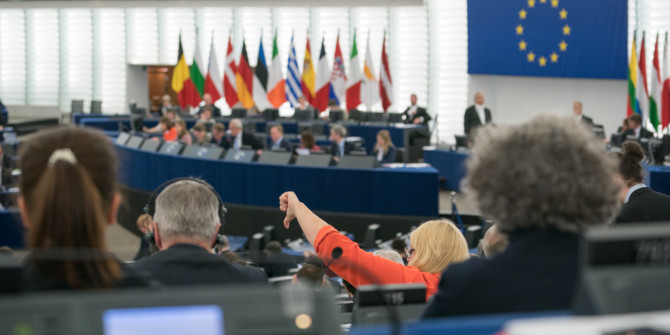 Fresh elections will be held in Greece following the resignation of Alexis Tsipras as the country’s Prime Minister. Partha Gangopadhyay writes that while this latest twist in Greek domestic politics has raised more uncertainty about Greece’s ability to meet the conditions of its bailout agreement, there is a far wider structural problem with the Eurozone that cannot be addressed via bailouts or cosmetic changes. He argues that with states tied to a shared monetary policy, and with the EU possessing only a small budget for promoting convergence among its members, the EU simply lacks the fiscal capacity to deal with large economic shocks.
Fresh elections will be held in Greece following the resignation of Alexis Tsipras as the country’s Prime Minister. Partha Gangopadhyay writes that while this latest twist in Greek domestic politics has raised more uncertainty about Greece’s ability to meet the conditions of its bailout agreement, there is a far wider structural problem with the Eurozone that cannot be addressed via bailouts or cosmetic changes. He argues that with states tied to a shared monetary policy, and with the EU possessing only a small budget for promoting convergence among its members, the EU simply lacks the fiscal capacity to deal with large economic shocks.
The ongoing Greek crisis, like any other Greek tragedy, spurs the imagination of every observer that a happy end is just around the corner – potentially via an improbable and comical turn of events like a deus ex machina. Alas, no easy solution is on the horizon for resolving the crisis in the foreseeable future. Most recently, it was the turn of Prime Minister Alexis Tsipras to quit and call early polls. With remarkable alacrity, several rebel Syriza MPs broke away to join a new party, called Laiki Enotita (Popular Unity), to fight the bailout. Yet regardless of how these developments in Greek politics play out, the economic problems for the European Union remain deep-rooted and cosmetic changes, like bailout economics, will inevitably fail.
In the broader framework of economics, it is one of the most enduring realities that economic activities are unevenly distributed in space – the European Union (EU) is no exception. The natural advantages of some regions in the EU over others usually lead to clusters of economic activities in more advantageous centres, while others tend to suffer. In other words, should it surprise a keen observer of human development that nature is divisive? It should not since natural and economic advantages are not equal among regions, with different areas of the EU exhibiting climatic advantages, relative resource abundance, educational cleavages and different degrees of accessibility.
All these features, which are grouped under the label of first nature, play an important role in explaining the concentration of economic activities and opulence in specific locations of the EU. The EU is a dualistic system: northern members exhibit high labour productivity while other members suffer from low productivity. Put simply, the features of ‘first nature’ set some unequal constraints across the EU, which lead to an unequal (spatial) distribution of economic activities and uneven spatial economic and social development, generating uneven opulence.

It is also the case that human beings have always responded to the binding constraints of first nature, mainly by taking advantage of the unequal spatial distribution of economic activities and uneven opulence. The intended and unintended consequences of these human responses have acted upon and re-written the existing constraints. The responses by individuals to the features of first nature are termed ‘second nature’.
Within every region in the EU there are therefore forces that promote a concentration of economic activities, known as the centripetal force, which is in constant opposition with the centrifugal forces that tend to disperse economic activities away from the region in question. The structure of any regional economy within the EU is influenced by the constant tensions between these twin forces. The past and current architects of the EU wagered that centrifugal forces will eventually exceed their centripetal equivalent, triggering economic and social convergence within the EU.
Of course, such convergence has proven difficult to realise. In the past, during the second half of the 20th century, the burden of adjustment in this dualistic Europe took place through the devaluation of national currencies. With the advent of Economic and Monetary Union, this mechanism became unavailable for member nations, with monetary policy becoming subject to a one-size-fits all approach. Between 2000 and 2008, trends in GDP growth among Southern nations mirrored the EU average and people started to see the merits in the EU’s wager on convergence. Unfortunately, with the advent of the global financial crisis, the EU has come to witness the ugly head of divergence again and the North-South divide has become only too obvious during the second Eurozone recession since 2011, visible in particular in terms of unemployment rates across the EU.
The EU does not have the fiscal capacity to deal with recessions. This becomes a serious problem if individual nations, suffering from a deep recession, have already accumulated large debts so that fiscal policy is no longer available as a recession fighting mechanism. The only available mechanism to indebted nations to fight recessions is the so-called process of ‘internal devaluation’, which is a substitute for (currency) devaluation. Internal devaluation seeks to cut labour costs and thereby shifts the burden of adjustments within the EU to workers. The Syriza government has been the expression of resistance to this shift in Greece.
During the formation of the EU, two treaties were established to promote economic, social and territorial convergence with balanced economic growth within the Union. The preamble to the Treaty on European Union (TEU) seeks “to achieve the strengthening and the convergence of the EU economies”. The creation of Economic and Monetary Union with a single and stable currency was widely vetted as a means for upward convergence. Article 3 of the Treaty on European Union (TEU) unequivocally highlights that sustainable development of EU countries will call forth balanced economic growth, price stability and social justice to achieve full employment and social progress. Article 3 also notes that the main scourges to the EU will include “social exclusion and discrimination” within the Union.
The means to achieve this sustainable EU are then described in great detail in the Treaty on the Functioning of the European Union (TFEU). In TEFU, the architects of the EU craft the union-wide policy of “overall harmonious development” with the ultimate goal of “reducing disparities between the levels of development of the various regions and the backwardness of the least favoured regions”. Through the creation of three funds – the European Regional Development Fund, European Social Fund and the Cohesion Fund – the EU seeks to promote investments in infrastructure, human capital, innovation, resource efficiency and business development. They cover the entire Union and the focus of the funds lies in the ‘less developed regions’, whose GDP is below 75 per cent of the EU average.
Despite the good intentions of this framework, the EU has a miniscule budget of 1 per cent of GDP. Within that budget, EU convergence and cohesion policy has an allocation of only 0.4 per cent of GDP, which is a budget for all 28 members of the EU for promoting long-term convergence between countries and regions within countries. This is barely adequate. In other words, the EU does not have the fiscal capacity, as an insurance mechanism for member states, to exercise temporary fiscal stimuli to combat an economic downturn in multiple member countries. Unless the current architects develop an adequate fiscal capacity, the EU will fail to act responsibly whenever large economic shocks hit them.
Please read our comments policy before commenting.
Note: This article gives the views of the author, and not the position of EUROPP – European Politics and Policy, nor of the London School of Economics.
Shortened URL for this post: http://bit.ly/1MI4vrD
_________________________________
 Partha Gangopadhyay – University of Western Sydney
Partha Gangopadhyay – University of Western Sydney
Partha Gangopadhyay is Associate Professor of Economics at the University of Western Sydney.






It’s nice to see that someone has a realistic view of the situation in the EU. I think this is the first view I have read that is reasonable. I was growing weary of whining about the evils of austerity when austerity is really nothing more than balancing one’s budget.
The EU organization needs to be reorganized under a different constitution which considers more reality than optimism about the future. That doesn’t mean that an EU provides no benefits but certainly expecting any segment of the EU to pay to improve the lifestyle to that of the highest paid region isn’t reasonable. The union could implement transportation agreements lowering transportation costs across the EU. It’s possible, although unlikely, that borrowing costs could be improved but each area must pay for itself because ultimately any one area will not support another area’s desire for a higher lifestyle.
Ultimately manufacturing capability might be less costly in lower income areas but that’s only if those areas develop integrity (such as paying taxes and making government promises which can be kept long term) and sufficient work ethics to compensate for the current lack thereof.
Free movement between EU countries would be a great benefit but currently this is obviously not wise as immigrants are flocking to the EU to get better lifestyles and the EU is inviting them in and increasing their own societal costs despite no increase in GDP with which to pay for those escaping from a world caught in too much debt.
Fiscal realism in the primary problem of the EU charter and its interpretation by the different regions.
A well argued piece by Partha. The main problem with the EU is that it is trying to be a federal state without the powers of a federal state. It does not even have a Central Bank with the powers of lender of last resort. It does not have a fiscal authority that can redistribute income to the poorer regions of the EU, unlike say the USA which subsidises its poorer states. In addition to that, the EU is still hung up about “austerity” in a period when most of the states of the EU are in recession.
Agree, it lacks fiscal transfers but needs these to function properly. Very well argued piece that recognises it isn’t a problem with Greece but with the Eurozone. It makes no more sense to blame Greece than it does to blame doctors for a failing health service – put people in a poorly designed structure and things will fall apart, but it’s the fault of the structure, not the isolated people who make mistakes within it.